Food and nutrients that fortify and strengthen your immune system health
Introduction: The strong immunity diet
The immune system is a complex structure designed to protect the body from foreign pathogens such as viruses, bacteria, and other toxins. This structure is made up of the innate immune system which is the portion of the immune system a person is born with, and the acquired immune system which is the portion of the immune system that is developed in response to exposure to chemicals released by microbes.
These two parts of the immune system work collectively to produce antibodies that protect the body from foreign invaders.
Organs and systems that are involved in this process include the lymph nodes, spleen, tonsils, adenoids, respiratory system, and the gut among various others (Johns Hopkins Medicine, 2020).
In order to function optimally, the immune system must be nurtured and cared for.
The foods we ingest go a long way towards either building up or breaking down the immune system. By choosing specific foods and nutrients we can fortify the strength and function of our immune system and live a healthier life.
The following outlines a list of foods and nutrients that offer valuable benefits for immunity and outlines how those foods and nutrients add value to our immune systems.
Best Foods To Boost Immunity
Almonds
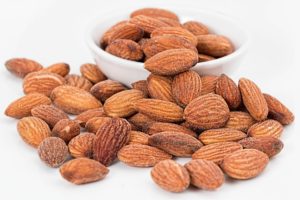
If not managed, free radicals can cause irreparable damage to healthy cells and promote carcinogens. Riboflavin, also found in almonds, plays a role in strengthening the immune system by attaching itself to protein enzymes called flavoproteins and encouraging oxygen-based energy production (Toole, 2014).
Research has also shown that the skin of almonds is particularly potent in boosting the body’s immunity to common viruses like the cold or flu. Even when up against the Herpes Simplex Virus 2, which causes cold sores and is a notoriously difficult virus to treat, almond skins proved effective in minimizing symptoms.
Not only that, but It is thought that compounds called polyphenols in almonds increase white blood cell sensitivity so that at the first sign of trouble, these fighter T cells are able to combat harmful viral cells (Toole, 2014).
Antioxidants

The review found that the ability of antioxidants to destroy free radicals protected the structural integrity of cells and tissues, and that diet could significantly contribute to this ability (Bendich, 1993).
Data indicated that the functions of the human immune system depended on the intake of micronutrients,
which can act as antioxidants.
Clinical trials have shown that supplementation with vitamins C, and E and beta-carotene increased the activation of cells involved in tumor immunity in the elderly.
Supplementation with antioxidant vitamins was also found to protect immune responses in individuals exposed to certain environmental free radicals (Bendich, 1993).
Vitamin C Foods
• All citrus fruits – oranges, lemons, limes, grapefruit
• Tomatoes and tomato juice
• Potatoes
• Peppers
• Acerola Cherries
• Rose Hips
• Chili Peppers
• Guavas
• Other foods: kiwi, strawberries, cantaloupe, Brussels sprouts, and green, yellow, and red peppers.
Vitamin E Foods
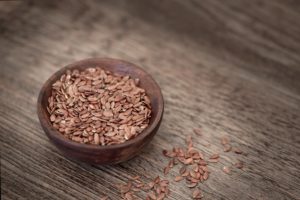
• Almonds, peanuts, hazelnuts, and other nuts
• Seeds – sunflower, pumpkin, and others
• Green leafy vegetables – kale, spinach, and broccoli
• Fortified foods including juices, cereals and margarine, and spreads
Beta Carotene Rich Foods
• Cod liver oil
• Eggs
• Beef liver
• Fortified breakfast cereals
• Fortified skim milk

• Broccoli, spinach, and most dark green, leafy vegetables
Broccoli
A study from the University of California-Berkley has found that a compound in broccoli ca boost the immune system. Researchers found that mice who were fed a solution of the compound 3,3′-diindolylmethane at a concentration of 30 milligrams per kilogram, saw increased blood levels of cytokines, which are proteins that help regulate the cells of the immune system.
Specifically, DIM led to a jump in levels of four types of cytokines: interleukin 6, granulocyte colony-stimulating factor, interleukin 12, and interferon-gamma. In cell cultures, researchers also discovered that, compared with a control sample, a 10 micromolar dose of DIM doubled the number of white blood cells, or lymphocytes, which help the body fight infections by killing or engulfing pathogens.
When DIM was combined with other agents known to induce the proliferation of lymphocytes, the effects were even greater than any single agent acting alone, with a three to a six-fold increase in the number of white blood cells in the culture.
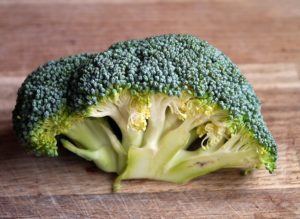
Bone Broth
Bone broth offers a variety of immune-boosting health benefits. Amino acids present in bone broth (arginine, glutamine, and glycine) are essential for the immune system and liver function, metabolism function, glutathione production, and quality sleep.
Bone marrow, also present in bone broth, contains lipids like alkylglycerols, which are necessary for the production of white blood cells. These have also been found to contain the growth of cancer tumor cells.
The collagen present in bone broth supports the function of healthy connective tissues, and it may also 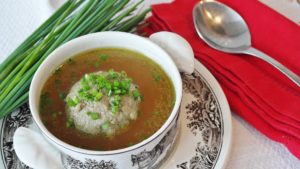
There is also a huge link between the immune system and gut health, and bone broth is shown to help seal and heal the gut. With roughly 80% of all immune system cells residing in the digestive system, the glycosaminoglycans found in bone broth help to restore the intestinal lining, as well as maintaining collagen and elastin content between tissue fibers.
Finally, bone broth aids in detoxification by clearing pathways and helping the digestive system remove waste (Delsaulniers, 2020). Each of these things supports the function and health of the immune system so it can operate at its best.
Citrus
Citrus fruits are high in Vitamin C which is linked to the increased production of white blood cells. White 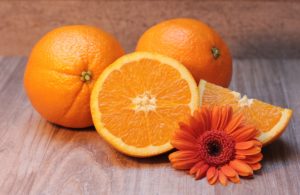
Certified nutritionist Vanessa Spiller notes that citrus fruits are also high in plant compounds that offer anti-inflammatory and antioxidant properties that support the immune system (Castaneda, 2020).
Some citrus fruits high in Vitamin C include oranges, limes, lemons, tangerines, and grapefruit, among others.
Colostrum
Colostrum offers protective antibodies and anti-inflammatory substances such as lactoferrin for the body. Most people are only familiar with colostrum as a byproduct of breastmilk, but it can also be obtained in powder form from grass-fed cows, goats, and other mammals.
This is why breastfeeding is heavily promoted for babies who have weak, unformed immune systems. The antibodies and anti-inflammatory strengthen the immune system of infants and offer protective benefits.
In fact, when the saliva of infants contains bacteria or pathogens indicative of illness, colostrum is produced as a response in the breast milk, actually changing the composition of the breast milk to help the infant fight the pathogen in their body (Moday, 2020).
Thus, colostrum can be a powerful additive offering significant immune-boosting properties when consumed regularly.
One of the benefits of being breastfed as a baby is the protective antibodies we get from our mother. These antibodies get us through the first years of life while our own immune system is learning the ropes.
This is why breastfed individuals are generally healthier and have fewer allergies as they get older.
Colostrum is the “first milk” from nursing mammals, and it’s a rich source of these protective antibodies, as well as anti-inflammatory substances like lactoferrin.
Garlic
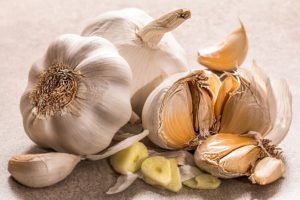
In its raw state, garlic offers antiviral and antimicrobial properties. The sulfur compound allicin found in garlic has been linked to the treatment of yeast infections, killing of parasites, decrease in the length and severity of viral infection, and the treatment of serious Gi infections like small intestinal bacterial overgrowth (Moday, 2020).
Garlic has also been known to help treat the common cold, lower blood pressure, and kill parasites within the body (Schaufelberger, 2007).
Ginger
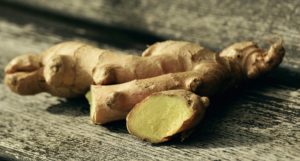
As a result, it can help normalize immune system function by either suppressing some immune responses during times of dysfunction (e.g. chronic inflammation and autoimmune conditions) or by boosting it when it is under-performing. This is likely linked to the active ingredient curcumin found in ginger (Gleb, 2017).
Studies also seem to suggest there are antibacterial properties associated with ginger. When compared against multiple drug-resistant bacteria, five out of seven pathogenic bacteria species responded to garlic extracts in one study. Researchers concluded the natural species of ginger possess anti-bacterial activity (Gleb, 2017).
Green Tea

Other research looked at the impact of green tea on immunocompromised rats. 35 immunocompromised rats were divided into groups and treated for 7 days with green tea extract. The results revealed that green tea extract acted as an immunomodulatory agent in immunocompromised patients.
The antioxidant and immunomodulatory properties acted as antiviral, antifungal, and anticancer agents. Thus, patients were treated, and their conditions improved as a result (Rahuya et. al., 2020.).
Manuka Honey
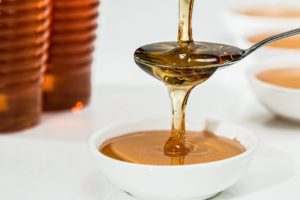
The high levels of the organic compound methylglyoxal (MGO) give honey its strong antibacterial properties. When tested against strains of bacteria manuka honey has been found to be effective in reducing almost all bacteria tested including some that were resistant to antibiotics, manuka honey has also been used in wound healing and tissue regeneration by facilitating the body’s natural ability to heal itself (Mountain Valley Honey, 2020).
Mushrooms
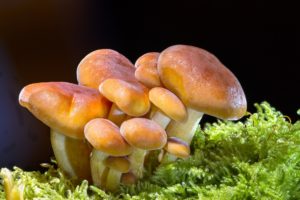
Maitake mushrooms are known to increase immune cells’ ability to engulf bacteria. Whereas reishi mushrooms, which must be taken as a dried capsule supplement or in a tea/tincture because they are not edible, are known to have antiviral and anti-cancer properties (Moday, 2020).
In the study “Dietary Intake of…White Button Mushroom Accelerates Salivary Immunoglobulin A Secretion in Healthy Volunteers,” people were split into two groups. Half ate their regular diet; and half ate their regular diet with cooked white button mushrooms every day for a week.
Then scientists measured the amount of IgA they were pumping out. There was no change in the control group, but after a week of mushrooms, IgA, or type A antibody secretion jumped 50% and even stayed up there for a week after they stopped the shrooms, before falling back to baseline (Greger, 2013).
There is also evidence supporting the anti-inflammatory properties of mushrooms. Research suggests the phytonutrient pyrogallol found in mushrooms reduced inflammation while also working to boost immune and anticancer function (Greger, 2013).
Red Bell Peppers

They also are high in beta carotene which is converted to vitamin A within the body, helping to promote healthy skin and eyes. Additionally, beta carotene is associated with the reduction of inflammation and an increase in disease-fighting cells which supports immunity (Schend, n.d.).
Spinach
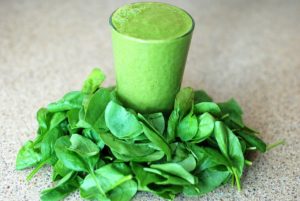
An iron deficiency can paralyze the immune system and prevent it from being able to tackle illness and pathogens. Then, it is a strong source of dietary potassium which is necessary to keep the immune system functioning smoothly. Adequate potassium levels ensure proper fluid balance and cell function.
Finally, spinach serves as a good source of calcium at nearly 250 mg of calcium per cup. Calcium surrounds foreign matter and essentially identifies it as bad so that other entities within the immune system like phagocytes can come and destroy it (5 ways spinach helps you boost your immunity, 2016).
Sunflower Seeds

While vitamin E is important in regulating and maintaining immune system function. Magnesium also supports many biochemical reactions within the immune system, while phosphorus is part of an integrated approach to support immune functions and maintain a stable microbial ecosystem in the GI tract, thereby protecting against potential pathogens.
Sunflower seeds are also incredibly high in selenium. Numerous studies have shown potential links between selenium and the ability to combat viral infections (Schend, 2020).
Turmeric
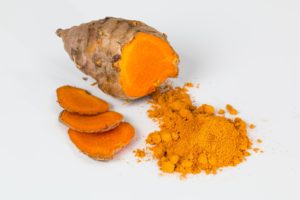
Th1 cells are involved in autoimmune system disorders such as inflammatory bowel disease (IBD) and rheumatoid arthritis. In multiple sclerosis, they destroy the outer myelin sheaths of nerve cells and the cells that make myelin. In IBD and allergies, curcumin also helps regulate Th2 cell response (LLC, 2020).
Curcumin also improves the phagocytic activity of macrophage cells to help get rid of plaque-building protein fragments. Macrophages and natural killer cells are part of the immune system’s arsenal.
Low concentrations curcumin inhibits macrophages from producing inflammatory cytokine proteins and free radicals while at the same time stimulating natural killer cells to help get rid of cancerous cells (LLC, 2020).
There is also evidence to suggest that turmeric compounds can help prevent and counteract the activation of immune system cells such as macrophages and lymphocytes that trigger proteins known as transcription factors. These go on to stimulate the production of inflammatory cytokine proteins and adhesion molecules that can cause tissue damage. But turmeric compounds essentially block this response. (LLC, 2020).
Yogurt
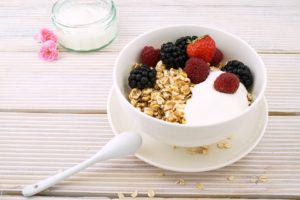
These probiotics have been shown to prevent and reduce the severity of colds and flu and may help protect against certain cancers.
Yogurt is known to be high in the vital probiotics lactobacillus and bifidobacterium making it an excellent way to stabilize gut bacteria and support the immune system. (Moday, 2020).
Water

Finally, moisture within the eyes and mouth helps these areas stay clean and fight infections that may try to enter the body through these orifices (Richman, & Wegrzyn, 2020).
Thus, drinking approximately 64 oz of water daily is a good way to ensure the body is getting the proper amount of water it needs to ensure proper immune function.
Protein
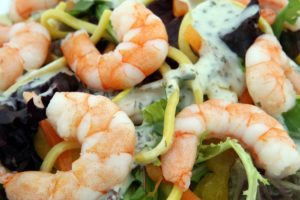
A January 2017 study published in the journal Immunity found that Myb protein specifically is crucial in keeping the immune system functioning properly and preventing the development of immune and inflammatory diseases.
A November 2012 review article published in the Journal of Obesity & Weight Loss Therapy found that many of the functions of the immune system, such as prevention of illness and speeding of recovery, can be compromised when too little protein is consumed.
For this reason, individuals should make sure they get the recommended dietary intake RDI0 of protein which is roughly 46 grams a day for women and 56 grams a day for men according to (Harvard Health Publishing, Bratskier, 2020).
Protein-Rich Foods
• Eggs
• Almonds
• Chicken breast
• Beef
• All fish
• Shrimp
• Turkey
• Tuna
• Quinoa
• Oats
• Cottage cheese
• Greek yogurt
• Milk
• Broccoli
• Whey protein supplements
• Lentils
• Soybeans
• Kidney beans
• Chickpeas
• Ezekiel bread
• Pumpkin seeds
• Flax seeds
• Sunflower seeds
• Chia seeds
• Brussels sprouts
• Peanuts
Vitamin B Complex
There are eight types of vitamin B that each serve a unique purpose within the body. However, when all at optimal levels they work collectively to boost and support immune function.
• Thiamine breaks down sugar molecules from food, produces fatty acid, synthesizes certain hormones, and creates certain neurotransmitters.
• Riboflavin is necessary for energy production, helping the body break down fats/ drugs/steroid hormones, converting tryptophan into niacin, and converting B-6 into a coenzyme the body needs.
• Niacin is involved in changing the energy in carbohydrates, fats, and proteins into a form the body can use, metabolic processes in the body’s cells, communication among cells, and expression of DNA in cells.
• Vitamin is needed for the body to create new coenzymes, proteins, and fats. Red blood cells carry pantothenic acid throughout the body so it can use the nutrient in a variety of processes for energy and metabolism.
• Vitamin B-6 is specifically involved in immune function, among other things. B-& plays a role in communication among cells in the body and regulation of DNA. Folate is also involved with DNA in terms of replication.
• Vitamin B-12 helps with creating new red blood cells,
• DNA synthesis, and brain and neurological function among other things. Collectively, these functions complement one another in support of strong immune function (Berry, 2019).
 Vitamin B Complex Rich Foods
Vitamin B Complex Rich Foods
• Milk
• Cheese
• Eggs
• Dark green vegetables: kale and spinach
• Vegetables: potatoes, avocados, and beets
• Whole grains and cereals
• Beans: chickpeas, black beans, and kidney beans
• Nuts and seeds
• Liver and kidney
• Red meat
• Chicken
• Fish
• Shellfish, including oysters and clams
• Citrus fruits, watermelon, and bananas
• Soy foods including milk, tofu, and tempeh
• Blackstrap molasses
• Wheat germ
• Yeast
Vitamin C
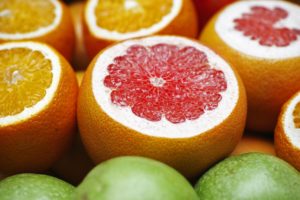
Vitamin C also works within the body to scout out and destroy free-radicals and it significantly protects against infectious disease. Vitamin c can be obtained from foods such as oranges, broccoli, tomatoes, papaya, kiwi, potatoes, and strawberries among others (Moday, 2020).
Vitamin C Foods
• All citrus fruits – oranges, lemons, limes, grapefruits
• Tomatoes and tomato juice
• Potatoes
• Acerola Cherries
• Rose Hips
• Chili Peppers
• Guavas
• Other foods: kiwi, strawberries, cantaloupe, Brussels sprouts, and green, yellow, and red peppers.
Vitamin D
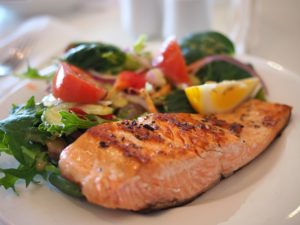
Whereas deficiency in vitamin D is associated with increased autoimmunity as well as increased susceptibility to infection (Aranow, 2012). In another report that report studied almost 19,000 subjects between 1988 and 1994.
Individuals with lower vitamin D levels were more likely to self-report a recent upper respiratory tract infection than those with sufficient levels, even after adjusting for variables including season, age, gender, body mass, and race (McDermot, 2020).
Another benefit of Vitamin D is reduced proinflammatory cytokine production, which may play a protective role during infections that cause a cytokine storm.
Vitamin D Rich Foods
• Salmon
• Herring and sardines
• Cod liver oil
• Canned tuna
• Egg yolks
• Mushrooms
• Fortified foods such as mile and juices enriched with vitamin D
Vitamin E
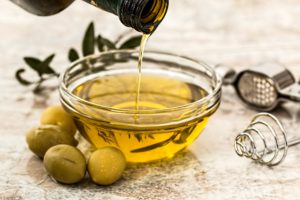
Vitamin E’s primary role in every step of the immune system is as an antioxidant that protects the cell membranes against free radical attacks. Vitamin E also supports the epithelial barrier by protecting cell membranes from oxidative damage (McDermot, 2020).
Vitamin E can be taken as a supplement or found in foods.
Vitamin E Rich Foods
• Sunflower, corn, soybean, and wheat germ oils
• Almonds, peanuts, hazelnuts, and other nuts
• Seeds – sunflower, pumpkin, and others
• Green leafy vegetables – kale, spinach, and broccoli
• Butternut squash
• Fortified foods including juices, cereals and margarine, and spreads
Zinc
Taking approximately 15 to 30 mg of zinc daily is a strong way to boost immunity. A 1998 review examined the link between zinc and immune function, ultimately finding that zinc deficiency increased a person’s susceptibility to pathogens. This is because zinc deficiency affects the development of acquired immunity by preventing the outgrowth and certain functions of T lymphocytes.
Additionally, zinc deficiency negatively impacts the macrophage, a vital cell in many immunologic functions, which can throw off intracellular killing, cytokine production, and phagocytosis.
Zinc is also necessary for normal development and function of cells that mediate nonspecific immunity such as neutrophils and natural killer cells. This means that maintaining adequate levels of zinc will keep many essential immune functions intact (Shankar & Prasad, 1998).
Zinc can be obtained via food or supplements.
Zinc Rich Foods
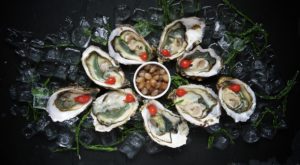
• Legumes – chickpeas, lentils, and beans
• Seeds
• Nuts
• Dairy – cheese and milk
• Eggs
• Whole grains
• Vegetables are the poor source, but potatoes, green beans, and kale have small amounts
• Dark Chocolate
Final Thoughts

Finding ways to add these to your diet and consume them regularly will prove to be immensely beneficial in keeping the immune system strong, healthy, and functioning at its best.
When it is at its best it can fight off pathogens and foreign entities and keep the body in its best shape, supporting prolonged health and wellness.
Eat well and take care!
References
5 ways spinach helps you boost your immunity. (2016, March 18). Health Total. https://www.health-total.com/immunity-articles/5-ways-spinach-helps-boost-immunity/
Bendich. (1993, September). The physiological role of antioxidants in the immune system. PubMed.
https://pubmed.ncbi.nlm.nih.gov/8227682/
Berry, J. (2019). Types of B vitamins: Functions, sources, and deficiencies. Health News.
https://www.medicalnewstoday.com/articles/325292#niacin
Castaneda, R. (2020, March 23). 8 foods that can support your immunity. US News & World Report. https://health.usnews.com/wellness/food/slideshows/foods-that-can-support-your-immunity?slide=5
Desaulniers, V. (2020, March 26). 5 ways bone broth boosts your immune system and fights cancer. Beat Cancer. https://beatcancer.org/blog-posts/5-ways-bone-broth-boosts-your-immune-system-and-fights-cancer/
Gleb. (2017, February 21). Ginger for immunity. Supplements in Review.
Greger, M. (2020, June 2). Boosting antiviral immune function with green tea. NutritionFacts.org. https://nutritionfacts.org/2020/06/02/boosting-antiviral-immune-function-with-green-tea
LLC, A. (2020). How can turmeric and turmeric compounds help enhance the immune system and cell activity? Turmeric.com.
https://www.turmeric.com/turmeric-health/inflammation-your-immune-system/turmeric-effects-on-regulating-immune-system-response
McDermot. (2020, July 8). 5 nutrients critical to immunity men are deficient in. Ouro Vitae.
https://www.ourovitae.com/5-nutrients-critical-immunity-men/
Moday, H. (2020, April 29). 12 all-natural ways to boost your immune system. mindbodygreen. https://www.mindbodygreen.com/articles/all-natural-ways-to-boost-your-immune-system
Rahayu, Prasetyo, & Purwanto. (2018). The immunomodulatory effect of green tea (Camellia sinensis) leaves extract on immunocompromised Wistar rats infected by candida albicans. PubMed Central (PMC).
https://www.ncbi.nlm.nih.gov/pmc/articles/PMC6048092/
Richman, & Wegrzyn. (2020, March 27). 25 natural ways to boost your immune system. Stacker.
https://thestacker.com/stories/4029/25-natural-ways-boost-your-immune-system
Science Daily. (2020, 9). Compound in broccoli could boost immune system, says study. ScienceDaily.
https://www.sciencedaily.com/releases/2007/08/070820175422.htm
Schaufelberger. (2007, August 22). Garlic: An immunity-boosting superstar. WebMD.
https://www.webmd.com/food-recipes/features/garlic-immunity-boosting-superstar
Schend, J. (2020). What to eat and drink to boost your immune system. Healthline.
https://www.healthline.com/health/food-nutrition/foods-that-boost-the-immune-system#sunflower-seeds
Toole. (2014, 3). Immune-boosting benefits of almonds. Healthy Holistic Living. https://www.healthy-holistic-living.com/immune-boost-almonds/
[content-egg module=Youtube template=tile]

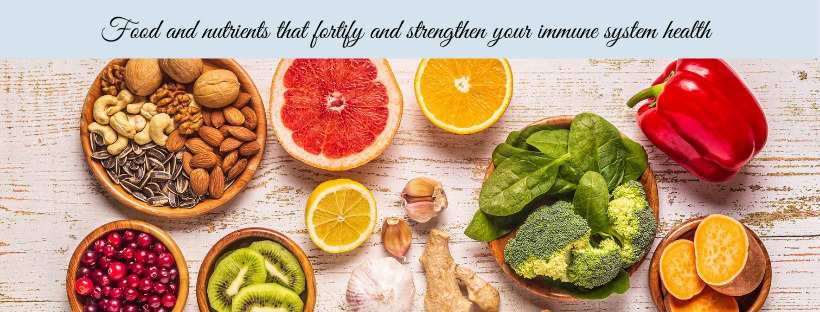
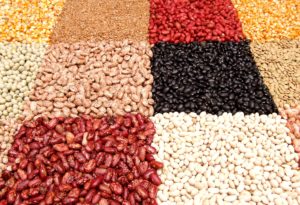 Vitamin B Complex Rich Foods
Vitamin B Complex Rich Foods

